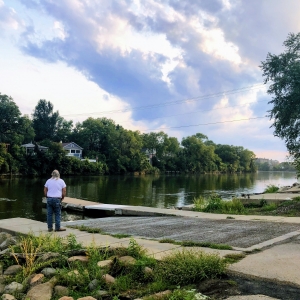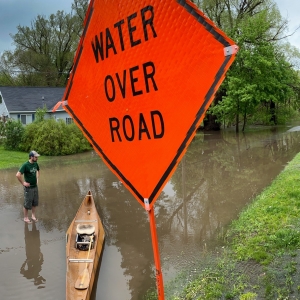Federal Water Tap, September 20: House Committee Approves $30 Billion to Remove Lead Drinking Water Pipes
The Rundown
- House Democratic leaders propose $30 billion in a budget reconciliation package for removing lead drinking water pipes.
- The budget reconciliation package includes money for school drinking water, colonias, areas affected by disasters, and aid to households to pay their water bills.
- The EPA alters its permitting guidance for pollution of surface water via groundwater.
- Federal researchers find high risk of long droughts in the Southwest even under modest warming, but reducing emissions can still blunt the most severe dry years.
- The Interior secretary signs a $1.9 billion tribal water rights settlement.
- The Bureau of Reclamation completes a study of water supply challenges in the Missouri River headwaters.
And lastly, the U.S. Forest Service begins planning for a forest restoration project in California to reduce fire risk.
By the Numbers
$30 Billion: Funding approved by the House Energy and Commerce Committee for removing lead drinking water pipes. The funding is part of the budget reconciliation package that is working its way through Congress. A separate infrastructure bill offers another $15 billion for lead pipe removal. The reconciliation package prohibits partial lead pipe replacement, and designates two-thirds of the funding for disadvantaged communities.
$700 Million: The budget reconciliation bill also includes $700 million for addressing lead in school drinking water, plus $500 million for water-bill assistance, $100 million for areas affected by disasters, $100 million for informal settlements along the U.S.-Mexico border (colonias), $100 million for water systems on Indian reservations, and $200 million for disadvantaged communities.
News Briefs
EPA Withdraws Trump-Era Groundwater Guidance
The U.S. Environmental Protection Agency withdrew guidance written by the previous administration for determining when groundwater pollution requires a Clean Water Act permit.
The guidance was written in response to a U.S. Supreme Court ruling in the County of Maui v. Hawaii Wildlife Fund case. In that case the justices introduced a new principle for assessing the pollution of streams, lakes, and oceans via subsurface flows.
The agency and state permit writers will evaluate each site on its own merits as the EPA considers new guidance.
Tribal Water Rights Settlement Signed
Deb Haaland, the Interior secretary, signed a water rights settlement for the Confederated Salish and Kootenai Tribes that has already been approved by the tribes, Congress, and the Montana Legislature.
The settlement promises $1.9 billion for water infrastructure and repairs to irrigation systems, and it quantifies the tribes’ rights to water. It also transfers management of the National Bison Range to the tribes.
Pesticide Permit for Water Pollution
The EPA finalized its general pollution permit for pesticides discharged into waterways. The general permit goes into effect on October 31 and is valid for five years.
Studies and Reports
Climate and Drought in the Southwest
Federal researchers contributed to a study investigating the risk of long droughts (two-plus decades) and severe one-year droughts in the Southwest.
The study found that even with modest warming there is a 50-50 chance by the end of the century of repeating the dry conditions that have settled over the region since 2000. The high level of risk, even with little additional warming, is due to less precipitation, especially in the spring.
Reducing emissions to keep warming in check is still critical, the study found, because it limits the risk of extremely dry years, which can shock the system.
Missouri River Management
The Bureau of Reclamation completed a study of water resource challenges in the Missouri River’s headwaters, in Montana.
The study used multiple scenarios to compare supply and demand projections. The analysis found that water availability is likely to increase, but there will be seasonal shifts that leave the area vulnerable to spring flooding and dry summers.
Options for responding to these changes run the gamut from more efficient farm irrigation, new off-channel reservoirs, and altering reservoir operations.
Challenges highlighted by the study include: growing municipal demand, changing runoff patterns, endangered species, hydropower, and irrigation.
The report is part of Reclamation’s basin study series, a collaborative analytical venture with local agency partners.
On the Radar
Forest Restoration in California
The U.S. Forest Service will begin an environmental review for a proposed 275,000-acre restoration project in Tahoe National Forest, some 90 miles northeast of Sacramento.
The goals of the North Yuba Landscape Resilience Project are to protect the watershed and communities from high-intensity wildfire, tree disease, and other forest stressors. The project also aims to reduce erosion into rivers and restore meadows.
Comments on the scope of the review are due in 30 days. Submit them here.
Southwest Drought Forum
Federal agencies will host a four-day online conference to discuss drought in the Southwest and what to do about it.
The conference runs September 21-22 and September 28-29. Speakers include representatives from academia, agriculture, environmental groups, tribes, cities, and state and federal officials.
Federal Water Tap is a weekly digest spotting trends in U.S. government water policy. To get more water news, follow Circle of Blue on Twitter and sign up for our newsletter.
Brett writes about agriculture, energy, infrastructure, and the politics and economics of water in the United States. He also writes the Federal Water Tap, Circle of Blue’s weekly digest of U.S. government water news. He is the winner of two Society of Environmental Journalists reporting awards, one of the top honors in American environmental journalism: first place for explanatory reporting for a series on septic system pollution in the United States(2016) and third place for beat reporting in a small market (2014). He received the Sierra Club’s Distinguished Service Award in 2018. Brett lives in Seattle, where he hikes the mountains and bakes pies. Contact Brett Walton







Leave a Reply
Want to join the discussion?Feel free to contribute!